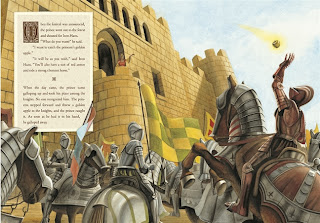After finishing our last paper, I feel the need to rehash
some of the Merlin stuff that we’ve left behind a few weeks ago and bring up a
few things in regards to modern media and the timeless fairy tales and legends
we’ve been reading.
(Heads up there might be spoilers for Merlin seasons 1-5 and
Once Upon a Time season 1 – read with caution.)
Doctor Who reference, in case you weren't aware.
I chose to write my paper on BBC Merlin because I thought
that this was as good of an excuse as any to binge watch an entire TV series on
Netflix. Who am I to look a gift horse in the mouth?
Other than heartbreak and tears I found BBC Merlin to be
unique from other Merlin’s in one major aspect – the relationship between
Arthur and Merlin. I promise I’m not about to do any crazy fangirl shippy
things here, I’m looking at their relationship in the most platonic and
analytical sense. Seriously though, these two characters are thrown together
because of prophecy and predestination and they make the very best of their
situation in regards to one and other. Arthur, the prophesized “Once and Future
King” is to be guarded and advised by Merlin – a wizard so powerful and eagerly
awaited that the Druids bow down to him (Druids are a really big deal in real
life mythology and in the show). The two don’t always see eye to eye, but they
create a bond so powerful that it lasts through multiple reincarnations.
BBC Merlin has one thing that none of the other Merlin’s
we’ve read about have: LOVE.
Yeah I had to do it.
Again, nothing fangirly here, but love is what sets the same
repeated characters apart from their older legends. The friendship that Merlin
and Arthur have is unique to the BBC rendition, and the love they have for one
and other and their friends is what the show revolves around.
Once Upon a Time (which I know a lot less about so please
correct me if I’m wrong here) seems to be doing the same thing. Take a legend
(in this case many legends) and modernize them in a way that commercial media
will appreciate.
The first season is more of an origin story where main
character Emma Swan is forced to confront the unbelievable truth that she is
the daughter of fairy tale characters and that the residents of her town,
Storybrooke, Maine, are all fairy tale characters who happened to have their
memories erased. That sounds more like a nightmare to me – trapped in Maine.
Cue snare drum, everyone laugh.
My sense of humor is impeccable. Sorry if you're from Maine. It's really a lovely place.
Where Merlin is about love, Once Upon a Time is about hope.
The characters move forward with the hope that their life meanings can be
restored, hope that they can triumph over evil, and most importantly, hope that
they can achieve happiness.
My reaction when things get too sappy.
BUT HOW DOES THIS RELATE TO MEDIEVAL MAGIC AND MYSTICISM?! I
honestly am not quite sure and that’s what I’d really like to discuss in the
comments on my post (please do it).
So far my best guesses are as follows: the new shows are a
clash of medieval and modern thought. In BBC Merlin for example, you see the
war between magic and common folk not unlike that seen in witch trials. That’s
a typical medieval thought (and a modern one but that’s for another discussion)
BUT love conquers all and magic can be used for good. So magic is what you make
it… that’s a pretty modern thought. As for Once Upon a Time we bear witness to
the struggles of fairy tale folk… and that’s not new at all – isn’t that exactly
what the medieval folk did to the original tales, listen to their struggles and
apply the morals to real life? So why do we change Merlin into a show about
love/friendship while we basically keep fairy tales the same?
Sources:
http://io9.com/5850277/in-once-upon-a-time-all-of-your-favorite-fairy-tale-characters-are-trapped-in-maine
http://en.wikipedia.org/wiki/Once_Upon_a_Time_(season_1)











